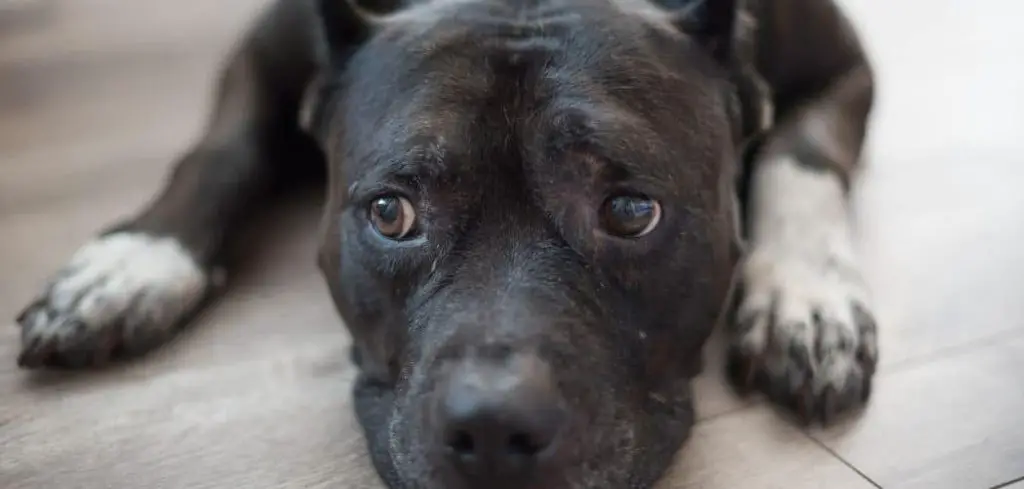Seeing mucus in a dog’s stool after surgery can be alarming for any pet owner. The presence of mucus may indicate digestive upset, infection, or other complications related to the procedure or recovery period.
It’s important to understand what this symptom could mean and when it requires professional help.
We outline the common causes of mucus in a dog’s poop after surgery, what you can do at home, and when to seek veterinary help.
Table of Contents
Mucus in Dog Poop After Surgery — Why It Happens
Mucus in a dog’s stool after surgery is often linked to stress, medications, dietary changes, or gastrointestinal irritation. Anesthesia and antibiotics can upset the balance of gut bacteria, while post-surgical stress may trigger digestive changes.
In some cases, mucus points to infection, inflammation, or slower gut movement caused by pain medication.
While mild mucus can be temporary, persistent or worsening symptoms should not be ignored.

Mucus in Dog Poop After Surgery: Common Causes
Anesthesia Effects
Anesthesia slows down a dog’s digestive system during surgery. After the procedure, the intestines may take time to return to normal function.
This slowdown can cause irritation in the colon, leading to mucus in the stool. Dogs may also strain to pass stool or have softer bowel movements during recovery.
Read more: Mucus in Dog Poop by Dog with Cancer (What it could mean)
Antibiotic Use
Many dogs are prescribed antibiotics after surgery to prevent infection. While necessary, antibiotics can disrupt the gut microbiome.
When healthy bacteria are reduced, the intestines may respond with loose stools, diarrhea, or mucus.
Pet owners may notice their dog producing slimy stools even if appetite and energy levels appear stable.
Pain Medication Side Effects
Medications like opioids and NSAIDs are often given for pain relief after surgery. Opioids, in particular, can slow gut motility, leading to constipation or irritation.
When the colon struggles to move stool effectively, it may produce excess mucus. NSAIDs, on the other hand, can cause gastrointestinal inflammation in sensitive dogs.
Stress and Anxiety
Surgery is stressful for dogs, both physically and emotionally. Stress can trigger colitis, an inflammation of the colon that often results in mucus-coated stools.
Dogs recovering at home may also feel anxious, especially if confined or limited in movement, which further contributes to digestive upset.
Dietary Changes After Surgery
Post-surgery, dogs are often fed bland or easily digestible diets to support recovery. A sudden change from their regular food can temporarily upset the digestive system.
The intestines may produce mucus as they adjust to new ingredients, or if the food is not well tolerated by the dog’s system.
Surgical Complications
In rare cases, mucus in the stool may be a sign of infection, inflammation, or complications related to the surgical site.
Internal irritation or damage to the intestines could result in abnormal stools with blood or heavy mucus. This is more serious and requires immediate veterinary assessment.
What to Do If Your Dog Has Mucus in Their Poop After Surgery
If the mucus is mild and your dog otherwise seems comfortable, you can support their recovery at home.
Ensure your dog has access to fresh water to stay hydrated, as digestive upset can lead to fluid loss.
Stick to the prescribed post-surgical diet and avoid offering treats or sudden food changes that could further upset the stomach.
Monitor your dog’s bowel movements closely over several days. Keep track of stool consistency, frequency, and any additional symptoms like straining or blood.
Providing a calm, stress-free environment will also help reduce digestive irritation caused by anxiety.
Probiotics may be beneficial if your vet approves them, as they can restore healthy gut bacteria disrupted by antibiotics. Never give over-the-counter medications without consulting your veterinarian, since some products can be unsafe for dogs in recovery.
When to Call or Visit Your Vet
Contact your veterinarian if the mucus is accompanied by blood, vomiting, diarrhea, or a loss of appetite.
These signs could point to infection, gastrointestinal bleeding, or surgical complications. A dog that seems lethargic, in pain, or unable to pass stool should be examined promptly.
If mucus persists for more than a few days, even without other symptoms, it’s wise to check in with your vet.
Prolonged digestive upset can interfere with recovery and may require adjustments to medication or diet. Trust your instincts—if something seems unusual or your dog’s condition worsens, professional evaluation is the safest choice.
Read more: Mucus in Dog Poop or Worms (How to tell the difference)
Key Takeaway
Mucus in dog poop after surgery is not uncommon, but it should always be monitored carefully.
While anesthesia, medications, stress, and diet changes are often the culprits, persistent or severe symptoms could signal something more serious.
Supporting your dog with hydration, a stable diet, and a calm environment helps recovery, but veterinary guidance is essential if symptoms don’t resolve. With attentive care, most dogs heal smoothly and return to their normal routines.
